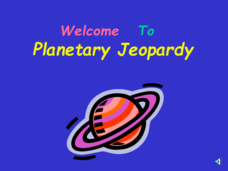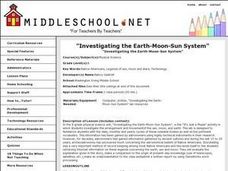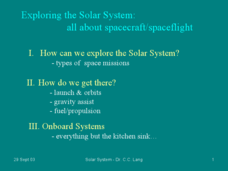Curated OER
Solar System Vocabulary
In this solar system vocabulary skills worksheet, students match the 13 solar system-related names and terms in the word bank to the appropriate definitions.
Curated OER
Solar System Crossword
In this solar system crossword puzzle instructional activity, students use the 13 clues and the terms in the word bank to help them correctly complete the word puzzle.
Curated OER
Microbial Influence on Earth's Systems
Students identify the different biogeochemical cycles on Earth. In this biology lesson, students observe microbes under a microscope. They compare and contrast respiration and photosynthesis.
NASA
Moon Phases and Eclipses
Starry-eyed astronomers draw different views of the Moon in order to introduce its phases. Then they experiment with a ball and a lamp to recreate the phases. A demonstration ensures every pupil understands the process, and the...
PBS
Why Isn't There an Eclipse Every Month?
Searching for an eclipse activity that sends scholars over the moon? Try an interesting interactive to get their minds active! The resource, part of an extensive Space series from PBS Learning Media, uses modeling and data analysis to...
Curated OER
The Sun, Moon, and Stars
First graders will learn about the Earth's place in our solar system and its relationship to the sun, moon, and stars in this vibrant PowerPoint. The ten slides are full of great photographs to give students the full effect of each...
Curated OER
Moons Of The Solar System
Students investigate the solar system and its moons. They conduct research in groups to find information. Also the teacher uses models of the planets in order to teach different facts about the solar system through the use of...
University of Colorado
The Jovian System: A Scale Model
Jupiter has 67 moons! As the seventh in a series of 22, the exercise shows learners the size and scale of Jupiter and its Galilean moons through a model. They then arrange the model to show how probes orbited and gathered data.
Science 4 Inquiry
The Impact of the Sun and Moon on Tides
In 150 BC, Seleucus of Seleucia theorized that the moon causes the tides. Scholars learn about what causes tides by studying the interactions of gravity between the sun, moon, and Earth. They use technology to formalize otherwise...
Curated OER
Planetary Jeopardy!
Space Science can be so much fun, especially when you play Planetary Jeopardy! This game tests students on what they know about Roman Gods, the planets and moons in our solar system, and the Earth's rotation.
Curated OER
Investigating the Earth-Moon-Sun System
Eighth graders research Native American legends involving the sun, moon, and stars and compare them to the origin of present day knowledge. They create a written report and make an oral presentation of their findings to the class.
Curated OER
Solar System Hall Model
Not novel, but fun, this lesson gets your space science learners to model the size of the planets and the solar system along your school's hallway. Scaled measurements as well as actual distances are provided for both planet diameters...
Curated OER
Crossword: Solar System
In this crossword worksheet, learners complete a crossword puzzle by solving clues about the solar system. For example, "All nine planets can be seen through a..."
Curated OER
Planets in Our Solar System
Each member of a four-student group takes on a specific aspect of an assigned planet to research. After gathering information, the team works together to create a travel brochure and a presentation intended to convince other classmates...
Curated OER
Exploring the Solar System: All About Spacecraft/Spaceflight
Rarely do you find resources that reach high school astronomy learners. Here is something at their level! The physics of flyby missions is explained via several examples. Landing, penetrating, and roving spacecraft are examined. Diagrams...
Curated OER
Moon Phases
Five multiple choice questions are provided in the handout about the phases of the moon. A digaram is included to help astronomy learners answer the questions. The diagram is meant to represent the appearance of the moon from the...
Curated OER
Our Solar System and Seasons
Sixth graders investigate the relative diameters of planets and distances between them and the cause for seasons on Earth using the 5-E Learning Model. They appreciate the size and distances involved with objects in the real universe....
Curated OER
Planets on Parade
Review all of the planets in our solar system with this informative PowerPoint. Each planet is listed on its own slide, accompanied by facts and an image. There are three multiple choice question listed at the end of the presentation.
Curated OER
Phase to Phase with the Moon
Fourth graders study the Moon phases. The lesson includes hands-on activities as well as web-based activities. They use models of the Moon and a lamp to study each of the phases of the Moon, and test their knowlege of the Moon on a web...
Curated OER
Earth Rotation
Students examine the rotation of the Earth as it occurs in the 24 hour cycle. They use models of planets and the globe to make observations of movements made. Students brainstorm prior knowledge and then participate in a demonstration of...
Curated OER
Saturn’s Moons
Students compare Saturn's moons to the Earth's moon. In this moon lesson students work in groups and complete a lab activity then answer questions.
Curated OER
Scale Activities
How do you put something as large as the universe in perspective? Use a series of scale experiments. Classmates collaborate around four experiments to examine the scale of the earth-moon system, our solar system, the Milky Way galaxy,...
University of Colorado
Clay Planets
Why do scientists use models? In the first installment of 22, groups create scale models of our solar system. They then share and discuss their models.
Curated OER
A Moon with a View
Third graders explore the rotation of Earth and the moon. In this solar system lesson, 3rd graders participate in an Earth and moon simulation in which part of the class "becomes" the sun, while other children represent the moon by...

























